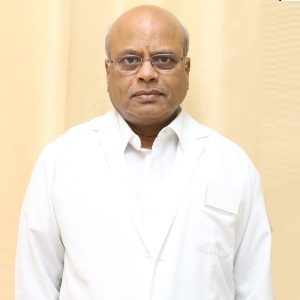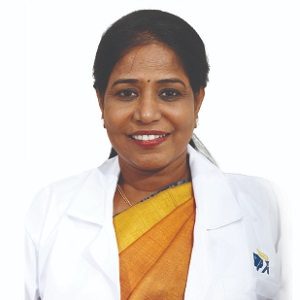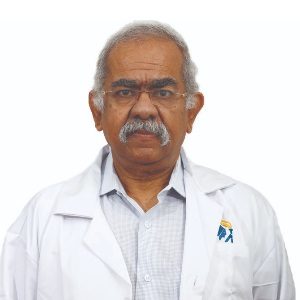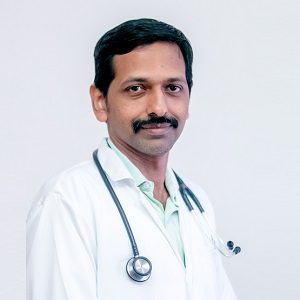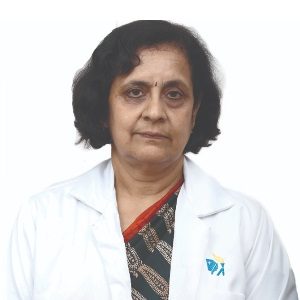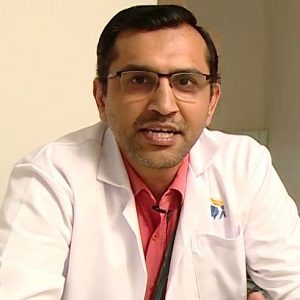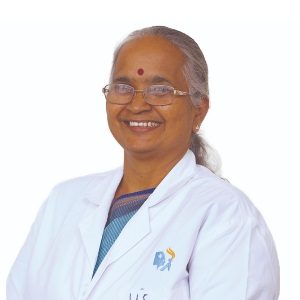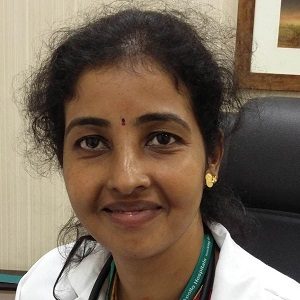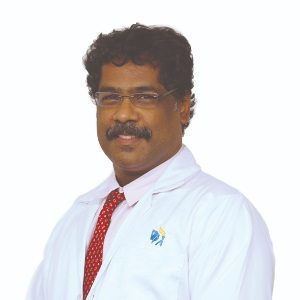Best Doctors in India for Cholangiocarcinoma Treatment
- Surgical Gastroenterologist, Chennai, India
- Over 27 years’ experience
Profile Highlights:
- Dr. Surendran R is an experienced gastroenterologist from Chennai, Tamil Nadu.
- He has been rewarded for his contributions to the field several times. He received The Best Doctor award from the Tamil Nadu government (2002) in his name.
- Being a gastroenterologist, he specializes in treating patients with problems such as Bowel Obstruction, Pancreatic diseases, Esophagus disorders, Fistula treatment, etc.
- Gastroenterologist and GI Medicine Specialist, Chennai, India
- Over 23 years’ experience
Profile Highlights:
- Dr. Revathy Shanmugam is an experienced Gastroenterologist in Tamil Nadu, having an experience of 23 years in the management of GI disorders, Training & Teaching.
- She is highly skilled in the services like Liver Disease Treatment and Inflammatory Bowel Disease (IBD) Treatment.
- She has published various scholarly works in many National & International Publications of Medical Gastroenterology.
- Gastroenterologist and GI Medicine Specialist, Chennai, India
- Over 32 years’ experience
Profile Highlights:
- Dr. Hariharan Muthuswamy is a veteran Gastroenterologist and Hepatologist in India with 22 years of experience (specialist).
- Dr. Muthuswamy treated his patients with Non-Surgical Piles treatment, Liver Disease Treatment, Hepatitis E, Hepatitis A Treatment and Hepatitis B Treatment, Hemorrhoids Treatment, Colonoscopy, Stomach, and Intestinal Treatments, etc.
- He has a special interest in Capsule Endoscopy, Therapeutic Endoscopy, GERD, and Irritable Bowel Syndrome (IBS).
- Gastroenterologist and GI Medicine Specialist, Chennai, India
- Over 32 years’ experience
Profile Highlights:
- Dr. Mohan A T is a veteran GI medicine specialist in India with an experience of 32 years.
- Dr. Mohan, an alumnus of Madras University, is the Co-Ordinator of the Indian Society of Enteral and Parenteral Nutrition.
- He is an expert in treating Gastritis, acidity, Ulcerative Colitis, and many other Intestinal and bowel-related Treatments. In addition to these, he offers Colonoscopy, Gastroscopy, and Endoscopy.
- Gastroenterologist and GI Medicine Specialist, Chennai, India
- Over 15 years’ experience
Profile Highlights:
- Dr. Piramanayagam P is one of the young Gastroenterologists in India, having an experience of 15 years in the field.
- The doctor offer services like Gall Bladder (Biliary) Stone treatment, IBS treatment, Acidity Treatment, Endoscopy, and stomach and intestine dysfunction.
- He published many review articles and books under his name.
- Gastroenterologist and GI Medicine Specialist, Chennai, India
- Over 39 years’ experience
Profile Highlights:
- Dr. Sarojini Parameswaran is one of the renowned Gastroenterologist with an overall experience of 39 years.
- Dr. Parameswaran is brilliant and quick with diagnosis. She has 22 years of specialist experience.
- Gastroenterologist and GI Medicine Specialist, Chennai, India
- Over 24 years’ experience
Profile Highlights:
- Dr. Seshadri Venkatesh P is a well-known Gastroenterologist in India, having 24 years of experience in Stomach and Intestine disorders.
- Dr. Seshadri acquired proficiency in managing Bladder Cancer surgery, hemorrhoids, Irritable Bowel Syndrome (IBS) Treatment, etc.
- He holds membership in Tamil Nadu Medical Council.
- Gastroenterologist and GI Medicine Specialist, Chennai, India
- Over 40 years’ experience
Profile Highlights:
- Dr. Usha Srinivas is a Gastroenterologist in India with an experience of 40+ years in GI in medicine and academics.
- Patients visit her for consultation and treatment of abdominal pain, Gall Bladder (Biliary) Stone, Gastroenteritis, Jaundice, Colonoscopy, Steatosis, Constipation Treatment, Hepatitis C Treatment, Hepatitis E Treatment, Hemorrhoids Treatment, Piles Treatment (Non-Surgical), Gastritis Treatment, Ulcerative Colitis Treatment, and others.
- Gastroenterologist and GI Medicine Specialist, Chennai, India
- Over 18 years’ experience
Profile Highlights:
- Dr. Preethi M is one of the best gastroenterologists in India, with 18 years of expertise.
- Dr. Preethi received many awards for her contribution to the field.
- She offers consultation for Irritable Bowel Syndrome (IBS), Hemorrhoids, Endoscopy, female problems, and other gastrointestinal issues.
- Gastroenterologist and GI Medicine Specialist, Chennai, India
- Over 23 years’ experience
Profile Highlights:
- Dr. Ubal Dhus is a GI specialist doctor in South India who is proficiently managing Gastroenterological disorders for the past 23 years.
- He acquired his medical degree from Madras University, Chennai, and served people with Hemorrhoids Treatment, and Irritable Bowel Syndrome (IBS) Treatment.
Best Hospitals in India for Cholangiocarcinoma Treatment
Venkateshwar Hospital, Dwarka, New Delhi
- City: New Delhi, India
Hospital Highlights:
- State-of-the-art technology and devoted healthcare professionals have been brought together under one roof at Venkateshwar Hospital to provide genuine medical care. The hospital’s professionals work together as a team to deliver the best possible treatment to their patients, using the most sophisticated equipment and information technology.
- Venkateshwar Hospital’s mission is to attain global excellence in healthcare by employing evidence-based, ethical clinical practices and cutting-edge technology by a team of highly skilled experts.
MGM Healthcare, Chennai
- City: Chennai, India
Hospital Highlights:
- Located in Chennai, India, MGM Healthcare is a top multispecialty hospital that provides all medical services under one roof.
- Since its founding in 2019, MGM Healthcare has quickly become a leading national referral centre, creating several innovative flagship initiatives.
- MGM Healthcare combines next-generation medical and digital technologies to provide better patient results.
- With 12 centres of excellence, more than 400 inpatient beds, 100 intensive care unit beds, and 24/7 emergency care, MGM Healthcare leaves no chance in redefining the patient experience in Chennai.
- MGM Healthcare boasts 250+ expert doctors across 30+ departments, including Cardiology, Pulmonology, Neurology, Obstetrics & Gynaecology, and more.
- They house 12 specialized Centres of Excellence, including Neurosciences, Orthopaedics, and Multi-Organ Transplantation.
- Their team of doctors, nurses, and paramedics works together to give every patient individualized treatment.
Cholangiocarcinoma
Cholangiocarcinoma, which is also known as bile duct cancer, is a cancer that forms in the slender tubes or bile ducts that carry the fluid bile, which helps the body digest fat. Bile ducts connect the liver to the gallbladder as well as to the small intestine. This condition, which is generally uncommon, occurs mostly in people who are over the age of 50. However, it can even appear in younger people.
Unfortunately, cholangiocarcinoma is one of the types of tumor that is difficult to treat.
Types
Cholangiocarcinoma is of three main types:
- Intrahepatic Cholangiocarcinoma- This type occurs in the parts of the bile ducts that are within the liver and may also be classified as a type of liver cancer.
- Hilar Cholangiocarcinoma- This occurs in the bile ducts just outside of one’s liver. This type is also known as perihilar cholangiocarcinoma.
- Distal Cholangiocarcinoma- This type can occur in the portion of the bile duct which is nearest to the small intestine.
Symptoms
Signs and symptoms of this condition can include the following:
- Yellowing of your skin as well as the white portion of your eyes, i.e. jaundice
- White-colored stool
- Fatigue
- Abdominal pain
- Intensely itchy skin
- Unintended weight loss
See your doctor if you continue to have persistent fatigue, abdominal pain, jaundice, or any such signs and symptoms that you are finding bothersome. He/she may refer you to a specialist in digestive diseases i.e. a gastroenterologist.
Causes & risk factors
Cholangiocarcinoma generally occurs when the cells in the bile ducts develop changes in their DNA. Your DNA is the material that provides instructions for every chemical process in the body. DNA mutations can change the instruction. One result is that cells might begin to grow out of control, and eventually form a tumor i.e. a mass of cancerous cells.
It is not yet clear what exactly leads to the genetic mutations leading to cancer.
Some of the factors that can increase the risk of cholangiocarcinoma include:
- Chronic liver disease- Scarring of the liver which can be caused by a history of the chronic liver disease also increases the risk of cholangiocarcinoma.
- Primary sclerosing cholangitis- This disease can cause hardening and scarring of the bile ducts.
- Bile duct problems present at birth- People who are born with a choledochal cyst, which can lead to dilated and irregular bile ducts, have an increased risk of having cholangiocarcinoma.
- A liver parasite- In certain areas of Southeast Asia, cholangiocarcinoma is associated with liver fluke infection. This can occur if one eats raw or undercooked fish.
- Smoking- Smoking is also associated with an increased risk of cholangiocarcinoma.
- Older age- Cholangiocarcinoma generally occurs among adults who are over the age of 50.
Cholangiocarcinoma is not inherited but according to studies blood relatives of a person with cholangiocarcinoma might have an increased risk of developing cancer compared to the general population. However, most of the people suffering from this condition do not have any family history of the disease.
Diagnosis
Liver function tests
Tumor marker test
Endoscopic retrograde cholangiopancreatography
Imaging tests
Biopsy
Biopsy is a procedure which involves removing a small sample of tissue for examination under a microscope.
If any suspicious area is located near where your bile duct joins the small intestine, your doctor might obtain a biopsy sample during ERCP. If the suspicious area is located within or near the liver, your doctor will need to obtain the tissue sample by inserting a long needle through your skin to the affected area. This is also known as fine-needle aspiration. He/she might use an imaging test as well, such as endoscopic ultrasound or CT scan, as it can help guide the needle to the area precisely.
How your doctor chooses to perform the biopsy will very likely influence which treatment options are going to be available to you later. For example, if your doctor uses y fine-needle aspiration for performing the biopsy, you will not be legible for liver transplantation.
Treating cholangiocarcinoma is difficult and therefore you should not hesitate to ask about your doctor’s experience with diagnosing this condition. If you have any doubts, you can get a second opinion.
Once your doctor confirms a diagnosis of cholangiocarcinoma, he/she is going to try to determine the extent or the stage of the cancer. This generally involves additional imaging tests. Knowing the stage of the cancer is also going to help in choosing the treatment option.
Treatments
Surgery
Chemotherapy
Radiation therapy
Liver transplant
Surgery that involves removing a liver and replacing it with one from a donor is known as a liver transplant. This is an option in certain cases for people with hilar cholangiocarcinoma. For many, a liver transplant is generally a cure for hilar cholangiocarcinoma. However, there is a risk that the cancer might recur after the transplant.
Photodynamic therapy
In this method, a light-sensitive chemical is injected into a vein and it accumulates in the fast-growing cancer cells. Laser light which is directed at the cancer causes a chemical reaction in the cancer cells and thus causes them to die. Typically, multiple treatments are required. Photodynamic therapy can help in relieving your symptoms, and it may also slow the growth of cancer. After the treatments, you will need to avoid exposure to the sun.
Prevention
There’s no way in which you can entirely prevent cholangiocarcinoma.
However, taking certain steps can reduce the risk of the disease.
Stop smoking- Smoking is linked to an increased risk of this condition. If you smoke, it is best to stop. If you’ve tried to quit in the past and haven’t been successful, you can discuss this with your doctor.
Reduce your risk of liver disease- Chronic liver disease is also associated with an increased risk of cholangiocarcinoma. Some causes of liver disease are not preventable. But you should take proper care of your liver.
For example, to reduce your risk of liver inflammation, avoid alcohol or drink in moderation. It is best to maintain a healthy weight. When working with chemicals, it is also important to follow the safety instructions on the container.

